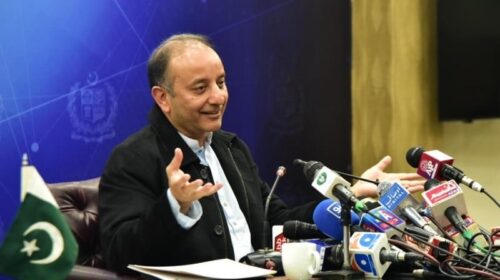Russia has confirmed the availability of 100,000 barrels per day crude oil supply to Pakistan and a delegation from Moscow would visit Islamabad in January to set terms of a deal, including rates and mode of payment, sources said on Monday, days after a Pakistani delegation visited Russia.
Minister of State for Petroleum Musadik Malik, who led the Pakistan delegation to Moscow, told a news conference that Russia had confirmed supply of petroleum products on “discounted rate”. However, the state minister did not give any indication of the price.
“Russia has confirmed the availability of 100,000 barrels per day of crude oil supply but has not confirmed the rate yet which will be discussed in January,” a source in the petroleum ministry told The Express Tribune, adding that the visit was scheduled to take place on January 23, 2023.
Earlier, Malik told the news conference that negotiations with Russia regarding oil and gas supplies had been very positive. “Russia will give us crude oil at a discounted rate,” Malik said. “Russia will give us a discount on refinery products, petrol and diesel,” he added.
Malik did not specify the price of the discounted oil or say whether the imports would comply with a $60 per barrel cap imposed by the G-7 nations and the EU on Russian seaborne oil from this week. Moscow has, however, said it will not sell to countries that comply with the cap.
The United States has told the Pakistani finance minister to purchase oil from Russia on that price cap. “Now, the question, whether Russia will agree with Pakistan on selling at the capped price will be clear during the visit of the Russian delegation,” the source explained.
Given a tight financial situation of Pakistan, Islamabad is not in a position to bypass the US. Washington has already stated that it has no sanctions on Russia oil exports for Pakistan and stressed that Islamabad will have to take a decision according to its circumstances.
Malik said that the government was determined to resolve the problems facing the energy sector. He told the news conference that talks were held with Russian companies regarding the liquefied natural gas (LNG) sector, Malik said.
He said that Pakistan had been invited to start contracts for 2025-26. “Now there will be government-to-government talks,” he added. “Besides the private sector, the Pakistani side also discussed Russia’s public sector firms for LNG imports.”
Responding to a question about the talks on the gas pipeline project, Malik said that the Russian side was asking for some concessions. “Fruitful discussions were also held on pipeline projects – Pakistan Stream Gas Pipeline and another ‘big gas pipeline’ to get the commodity from Russian hydrocarbon deposits,” he said.
The minister of state described his Russia visit “very important” because “the government wants Pakistan to be self-sufficient in every sector”. He said: “No factories should be closed. Every child should have a job. We have to fulfil this vision of the Prime Minister Shahbaz Sharif. We require energy to feed the economy.”
Malik pointed out that energy supplies would have to be increased by 8-10% every year to maintain gross domestic product (GDP) growth rate at 5-6%. He added the indigenous gas supplies were dropping by 8-10% annually. “We need energy for development and now we are taking steps to increase energy supplies.”
He said that Iran had also announced an additional supply of LPG to Pakistan, which would start in December and January. “Pakistan and Iran have finalised the initial principles and two sides have to make a decision on the remaining three to four points, including the currency, which will be finalised soon.”
Commenting on the current gas supply situation in the country, the minister of state said that the government had arranged extra gas for months of November, December and January as compared to the same months of the last year.
“The government is providing more gas compared to the supplies during the same period last year,” he added. When asked about the low pressure of gas, he replied that there was a problem of poor infrastructure which created the pressure issue in the remote areas, which was being rectified on priority basis.







